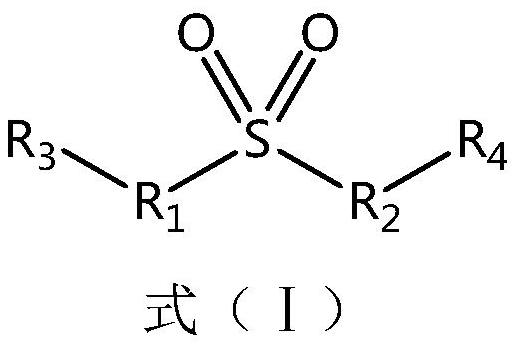Lithium ion battery non-aqueous electrolyte and lithium ion battery
A lithium-ion battery, non-aqueous electrolyte technology, applied in the field of lithium-ion batteries, can solve the problems of poor high temperature cycle performance, battery capacity decay, consumption of lithium ions, etc., to improve internal dynamic characteristics, improve high and low temperature performance, The effect of improving cycle performance
- Summary
- Abstract
- Description
- Claims
- Application Information
AI Technical Summary
Problems solved by technology
Method used
Image
Examples
Embodiment 1
[0044] Electrolyte preparation steps: in a glove box filled with argon, mix ethylene carbonate, diethyl carbonate and ethyl methyl carbonate according to the mass ratio of EC:DEC:EMC=30:20:50, and then add to the mixed solution Slowly add 12.5wt% of lithium hexafluorophosphate based on the total weight of the electrolyte, and finally add 1.0wt% based on the total weight of the electrolyte of the new chalcogenide compound additive shown in the structure of compound 1, and stir evenly to obtain the lithium ion battery electrolyte of Example 1.
[0045] The prepared lithium-ion power battery electrolyte was injected into the fully dried artificial graphite material / NCM811 battery, and after the battery was left at 45°C, formed by high-temperature fixtures and sealed twice, it was routinely divided.
Embodiment 2-14
[0046] Embodiment 2-14 and comparative example 1-6
[0047] As shown in Table 1, in Examples 2-14 and Comparative Examples 1-6, except that the composition ratio of the components of the electrolyte solution is added as shown in Table 1, the others are the same as in Example 1.
[0048] Table 1 embodiment 1-14 and the composition ratio of each component of the electrolyte of comparative example 1-6
[0049]
[0050]
PUM
 Login to View More
Login to View More Abstract
Description
Claims
Application Information
 Login to View More
Login to View More - R&D
- Intellectual Property
- Life Sciences
- Materials
- Tech Scout
- Unparalleled Data Quality
- Higher Quality Content
- 60% Fewer Hallucinations
Browse by: Latest US Patents, China's latest patents, Technical Efficacy Thesaurus, Application Domain, Technology Topic, Popular Technical Reports.
© 2025 PatSnap. All rights reserved.Legal|Privacy policy|Modern Slavery Act Transparency Statement|Sitemap|About US| Contact US: help@patsnap.com



